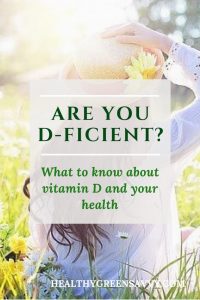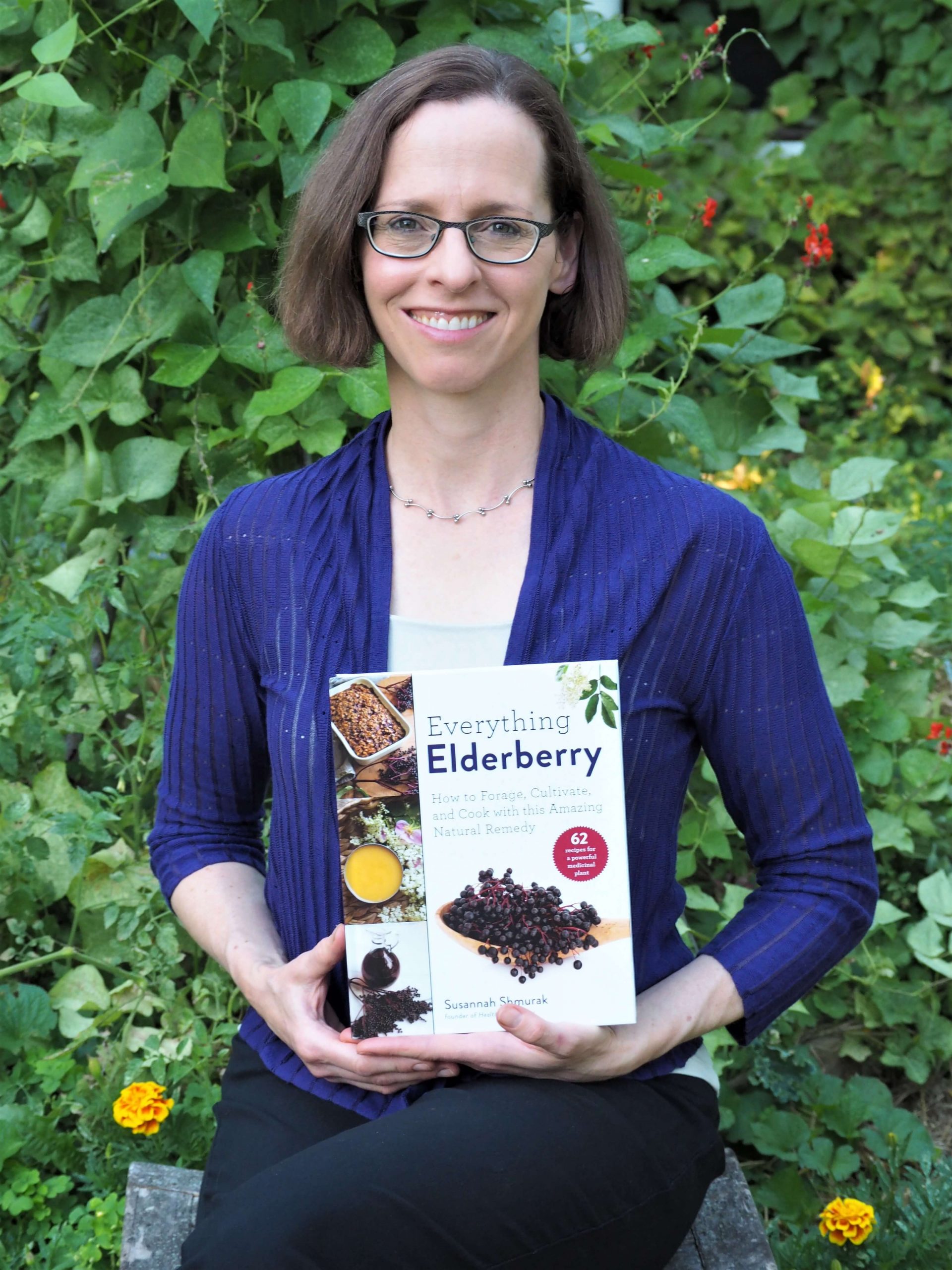Last Updated on December 19, 2022
Are you feeling run down? Getting sick more often? A vitamin D deficiency may be part of the problem. Find out the important health benefits of vitamin D.
Understanding the Health Benefits of Vitamin D
You’re busy, but you care about your health. That’s probably why you’re here, looking for savvy strategies to protect your health in both the short and long term. I always aim to spotlight the simplest steps you can take to live healthier every day, and getting enough Vitamin D is definitely in that category.
A vitamin D deficiency can have a pretty major impact on your health, and getting enough shouldn’t take much effort on your part. Hooray for easy health fixes!
When my eldest entered the public school system, I spent the ENTIRE year fighting off colds, some successfully, many (I lost count) not so much. I rarely felt healthy that entire year. I’m pretty sure insufficient time in the sun had something to do with it. Here in Minnesota, during the MANY cooler months we don’t get nearly enough sun exposure to make the vitamin D we need.
I stopped getting sick pretty much as soon as school ended and we were all outside a lot more. Maybe you’ve been there, too — multiple kids in school and daycare, bringing home virus after virus. It’s exhausting always feeling under the weather.
When the next school year rolled around, I dreaded nine more months of feeling crummy all the time. So I got serious about supporting my immune system, and vitamin D was one of the first things I turned to. My levels of D had likely recovered somewhat from a summer at the farm and in the garden, but I started being more proactive about getting D and some other critical nutrients involved in immune function.
Guess what? Hardly any colds!!! I had so much more energy and didn’t feel lousy all the time. What a relief!!!
Now, there’s no way to know exactly which of the nutrients I fell short on turned out to be the issue, or if it was some combination of factors, but regardless, current medical research says we should all be taking our vitamin D levels a lot more seriously, and not just to avoid a case of the sniffles. Check out some of the incredible health benefits of vitamin D below.
→Related: Learn more about Immune Boosting Foods
A D-ficiency Epidemic? Why Most Aren’t Getting the Benefits of Vitamin D
Our increasingly indoor lives have made vitamin D deficiency widespread. Plus concerns about skin cancer have made us more vigilant about slathering on sunscreen, which blocks our bodies’ production of vitamin D. (It’s not actually a vitamin, by the way, but a hormone our bodies produce in response to sunlight.)
If you live at higher latitudes (above 37 degrees north or below 37 degrees south), you probably just can’t get enough sun much of the year to make the vitamin D your body needs to function well. This useful map from Harvard Medical School shows where folks generally don’t get enough sun (except in summer) to make sufficient vitamin D.
Why are benefits of Vitamin D Important?
Vitamin D has a huge impact on your health! Your vitamin D levels play a role in
- immune function
- inflammation
- sleep
- mood
- metabolism
- energy
- bone health
- cardiovascular health
Being deficient in vitamin D may even up your risk of some types of cancer! (source)
Another critical benefit of vitamin D? Vitamin D also plays a role in gut health, which you’re probably aware has a major impact on your overall health.
More about optimizing gut health here.
Some researchers want more data before we all start going overboard with vitamin D supplementation. As with most things, moderation is probably wise, and if you’re considering supplements, be sure to discuss dosages with your doctor. Too much D from supplements can actually harm your health!
How to Enjoy the Benefits of Vitamin D
Getting vitamin D from the sun turns out to be a little harder than most people suppose. The UVB rays that prompt our skin to make vitamin D only reach us in the middle of the day (about 10-3), precisely the time dermatologists tell us to avoid in order to protect ourselves from cancer. What to do?
There’s some controversy about the safety of sun exposure, even in the name of getting enough vitamin D. According to the National Institutes of Health, “there are no studies to determine whether UVB-induced synthesis of vitamin D can occur without increased risk of skin cancer.”
Some in the medical community promote small amounts of time (10-15 minutes for fair skinned people; longer for those with dark skin) in the midday sun without sun protection to allow the body to manufacture vitamin D. Some research suggests that vitamin D is only one of the health benefits of getting outside, and that vitamin D levels are only a marker of the protective effects of sun exposure.
Others believe this practice will lead to accumulated sun damage and possibly skin cancer and prefer supplementation. Most agree that you should limit time in the sun, and if you must be in the sun for extended periods of time, sun protection is important.
Note that glass filters UVB rays, so sitting near a window (or in your car) won’t help your D levels, though because damaging UVA rays still penetrate glass, experts recommend wearing sunscreen when you drive. The time of day and year, cloud cover, and the darkness and age of your skin will all play a role in determining how much vitamin D you make. Skin becomes less efficient at producing it as we age.
While you can get some vitamin D from food, it’s hard to get enough on a regular basis. The best sources are fatty fish like salmon and eggs. Some people take cod liver oil, but you need to be careful not to overdose on vitamin A, which cod liver oil is particularly high in. Fortified foods and beverages often contain D-2, a version of vitamin D that may not get utilized by the body in the same way.
So supplementing with vitamin D-3 is a choice to consider if you’re not getting enough from the sun. Getting your vitamin D levels checked is the only way to know for certain whether you’re vitamin D deficient.
Choosing a Safer Sunscreen
Did you know most conventional sunscreens contain ingredients with known health hazards? The Environmental Working group publishes a sunscreen guide each year to help consumers choose safer, more effective sunscreens. You can see their most recent guide here.
And since I’m all about making it easy to for you to make the healthiest decisions, here are three sunscreens I can get behind. They not only get good grades from EWG, but they’re some of the most affordable nontoxic options. (Babyganics is the least expensive, but it scores a little lower for sun protection.) PLUS they’re B Corporations, companies that have committed to responsible business practices! (Read more about cool B Corporations we can all support here.)
More on safe sun protection here.
A number of studies suggest that certain foods have protective effects against sun damage and skin cancer. One more benefit of a diet featuring foods high in antioxidants such as green tea, colorful fruits and vegetables, and even chocolate. (If you’re interested there are lots of additional studies like the ones here, here and here).
If you’re concerned about your vitamin D levels, it’s best to discuss testing and supplementation with your doctor, who can advise you on the best approach.
Want to do more to help your body fight off cold viruses? Try enjoying some herbs that boost the immune system.
If you’ve succumbed to a cold, here are some excellent herbs for colds (and some helpful herbs for coughs as well).
Have you considered the benefits of vitamin D for better health? How do you get your D? Share in the comments!
This post is one in a series of Savvy Health Hacks, easy ways to ensure your body has what it needs to function optimally. Ready to hack your health? Check out these other practical tips to help you fight colds, sleep better, ward off disease, and have more energy:
- How to Eat For Better Sleep
- Are You Getting Enough Magnesium?
- Why You Need a Water Filter
- Immune Boosting Foods
- Health Benefits of Potassium
- Easy Health Hack: Sit Less
- Anti Inflammatory Food
- Health Benefits of Turmeric
- Health Benefits of Sunflower Seeds
- Easy Ways to Reduce Cortisol
Pin to save these benefits of vitamin D!
Disclaimer: I’m a health enthusiast, not a medical professional. Content on this website is intended for informational purposes only and is not meant to provide personalized medical advice. I draw on numerous health sources, some of which are linked above. Please consult them for more information and a licensed professional for personalized recommendations.
Benefits of vitamin D photo credits: jill111, Unsplash, chezbeate, PublicDomainPictures, Pexels

Susannah is a proud garden geek and energy nerd who loves healthy food and natural remedies. Her work has appeared in Mother Earth Living, Ensia, Northern Gardener, Sierra, and on numerous websites. Her first book, Everything Elderberry, released in September 2020 and has been a #1 new release in holistic medicine, naturopathy, herb gardening, and other categories. Find out more and grab your copy here.



 Hi, I'm Susannah, a garden geek, energy nerd, and fan of healthy food and natural remedies. Need some simple, practical solutions for living healthier and greener? You've come to the right place! More about me and my green projects
Hi, I'm Susannah, a garden geek, energy nerd, and fan of healthy food and natural remedies. Need some simple, practical solutions for living healthier and greener? You've come to the right place! More about me and my green projects